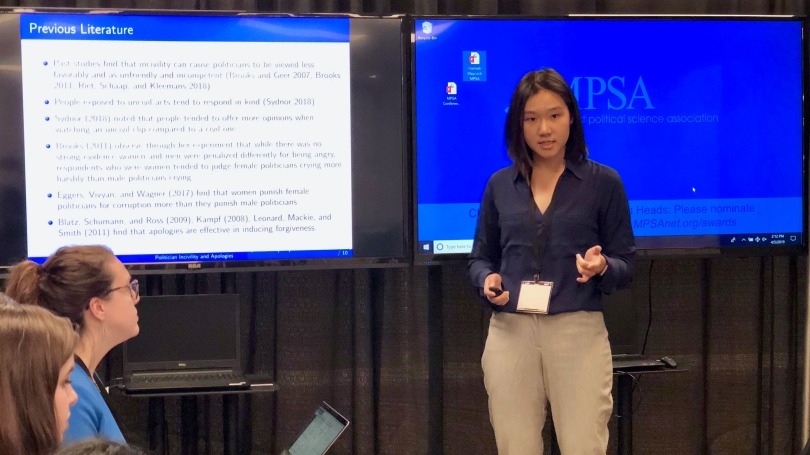
- Undergraduate
- Research
- About the Program
- News & Events
- People
Back to Top Nav
Back to Top Nav
Back to Top Nav
Back to Top Nav
Genna Liu and Jennifer Wu, both members of the Class of 2019 at Dartmouth College who are writing honors theses in the Program in Quantitative Social Science recently presented their projects at the 2019 Annual Meeting of the Midwest Political Science Association. This Chicago conference brings together faculty from across the country who are working on contemporary political science issues. The vast majority of presenters are faculty and graduate students.
Genna is examining what form of immigration policies Americans prefer and whether immigration framing affects preferences. Guided by Yusaku Horiuchi, her QSS thesis advisor, Genna addresses her research questions through a nationally-representative survey that includes components of conjoint analysis and framing treatments. In her project, she seeks to characterize the immigration policy packages that would garner the highest and lowest level of support among Americans. Genna finds that Americans prioritize family separation policies in determining preferences, though immigration preferences and salience differ by some respondent characteristics. With respect to variance, the largest polarization in immigration preferences exists between conservatives and liberals. Though Republicans and Democrats disagree on border security spending and legal status requirements, they have largely reached a consensus on citizenship requirements, E-Verify, family separation, and temporary foreign worker visas. Finally, Genna finds no effect of immigration framing on preferences and expectations about immigrants.
Jennifer is researching how people react to uncivil comments made by politicians and how people respond when politicians apologize for their uncivil comments. Furthermore, she examines how the gender of respondent and gender of the politician moderate how people react to politician incivility and apology. To study these issues, Jennifer and her thesis advisor, Yusaku Horiuchi, conducted a survey experiment using topics of immigration and sexual harassment in the United States. Jennifer finds that, for both topics of sexual harassment and immigration, an uncivil comment decreased people's evaluations of a politician compared to the control group; and, an uncivil comment and apology also decreased people's evaluation of a politician compared to the control group. However, there is no statistically significant difference between the uncivil group and the uncivil and apology group. In terms of gender, Jennifer finds that, while people do not tend to favor male or female politicians, both men and women tend to rate male politicians more harshly for making an uncivil comment for both topics. She also finds that although women do not penalize women more than men, men give women more leeway for making uncivil comments than women give women.
This year, ten students in QSS are writing Honors Theses. According to Jeremy Ferwerda, who is the Director of Undergraduate Research in QSS, "Rather than replicating prior work, the QSS Honors Students proposed a variety of original and ambitious projects. Genna and Jennifer's carefully designed survey experiments are a great example, and it's exciting that they were able to disseminate their research to the wider scholarly community."